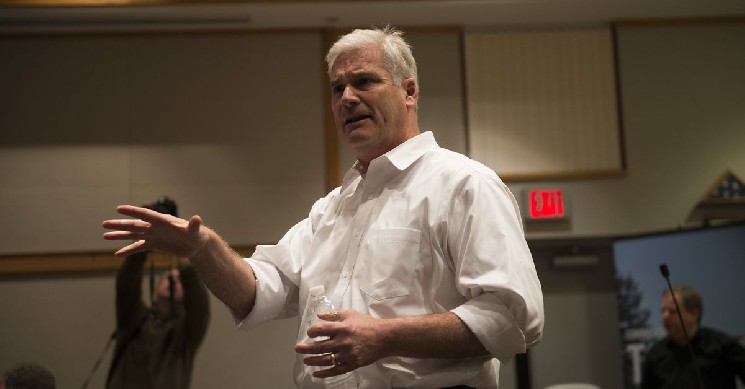Treasury Tornado Cash Sanctions Are ‘Unprecedented’, Warns US Congressman

The U.S. Treasury Department’s sanctioning of the Tornado Cash cryptocurrency mixer was an unprecedented move threatening privacy and innovation, according to one U.S. member of Congress. And he thinks Congress should start asking questions.
On CoinDesk TV’s “First Mover” program Thursday, Rep. Tom Emmer (R-Minn.) said the Treasury Department’s Office of Foreign Asset Control (OFAC) was wrong to sanction the service.
“I’m totally opposed to OFAC looking at this,” said Emmer. “My problem is that this software is controlled by code, not by any person or entity. So if you think about it, the sanctioning of Tornado Cash is an unprecedented shift in the Office of Foreign Asset Control in their sanctioning policy.”
“Their primary priority is protecting the United States national security,” he added. “So I think our role – Congress – can be most effective in inquiring with OFAC to find out if they believe the sanction addresses are controlled by people, not code, and what this means for privacy rights and innovation.”
The ban on Tornado Cash is driving internal debate on Capitol Hill regarding what regulatory agency should be responsible for oversight of cryptocurrencies, according to Rep. Emmer. He said government agencies now are “not doing the job they were assigned to do.”
When it comes to digital assets, it should be the job of Congress to define “what qualifies or fits the definition of cash, commodity and or a security,” and which agency should be responsible for regulating each, said Emmer.
The coin mixer’s sanction sent shockwaves across the industry, and reignited concerns about privacy and the use of open-source tools.
Congress now needs to get its “act together,” according to Emmer.
Emmer used the broadcast to once again slam the Securities and Exchange Commission (SEC) for what he considers overreaching its authority.
He said the SEC is not «staying within their lane,» using its position as more of a «shakedown authority.» Emmer pointed to requests for information and subpoenas the agency has sent to crypto companies, including companies who believe they do not fall under the agency’s purview.
With only 28 legislative days left this year, “it’s unlikely that any crypto legislation is going to move,” Rep. Emmer said, referring to bills clarifying which U.S. regulatory agency should oversee the cryptocurrency market. However, it’s “highly likely” next year the crypto community could finally get some sort of regulatory clarity, “so we hold not only regulators accountable, but they know what their lane is.”






 Bitcoin
Bitcoin  Ethereum
Ethereum  Tether
Tether  USDC
USDC  TRON
TRON  Dogecoin
Dogecoin  Cardano
Cardano  Bitcoin Cash
Bitcoin Cash  Zcash
Zcash  Chainlink
Chainlink  LEO Token
LEO Token  Monero
Monero  Stellar
Stellar  Litecoin
Litecoin  Hedera
Hedera  Dai
Dai  Cronos
Cronos  Tether Gold
Tether Gold  OKB
OKB  Ethereum Classic
Ethereum Classic  KuCoin
KuCoin  Gate
Gate  Algorand
Algorand  Cosmos Hub
Cosmos Hub  VeChain
VeChain  Dash
Dash  Tezos
Tezos  TrueUSD
TrueUSD  Stacks
Stacks  IOTA
IOTA  Decred
Decred  Basic Attention
Basic Attention  Theta Network
Theta Network  NEO
NEO  0x Protocol
0x Protocol  Synthetix
Synthetix  Qtum
Qtum  Ravencoin
Ravencoin  DigiByte
DigiByte  Zilliqa
Zilliqa  Nano
Nano  Holo
Holo  Siacoin
Siacoin  Numeraire
Numeraire  Waves
Waves  Ontology
Ontology  Status
Status  BUSD
BUSD  Hive
Hive  Enjin Coin
Enjin Coin  Pax Dollar
Pax Dollar  Lisk
Lisk  Steem
Steem  Huobi
Huobi  NEM
NEM  OMG Network
OMG Network  Bitcoin Gold
Bitcoin Gold  Augur
Augur  Bitcoin Diamond
Bitcoin Diamond  Ren
Ren